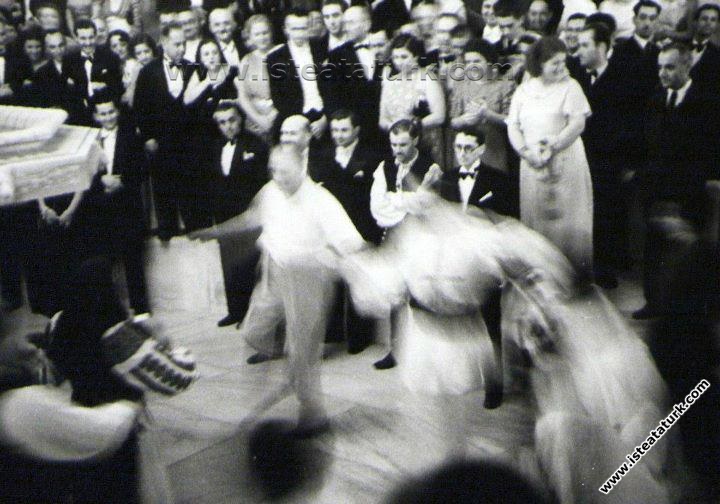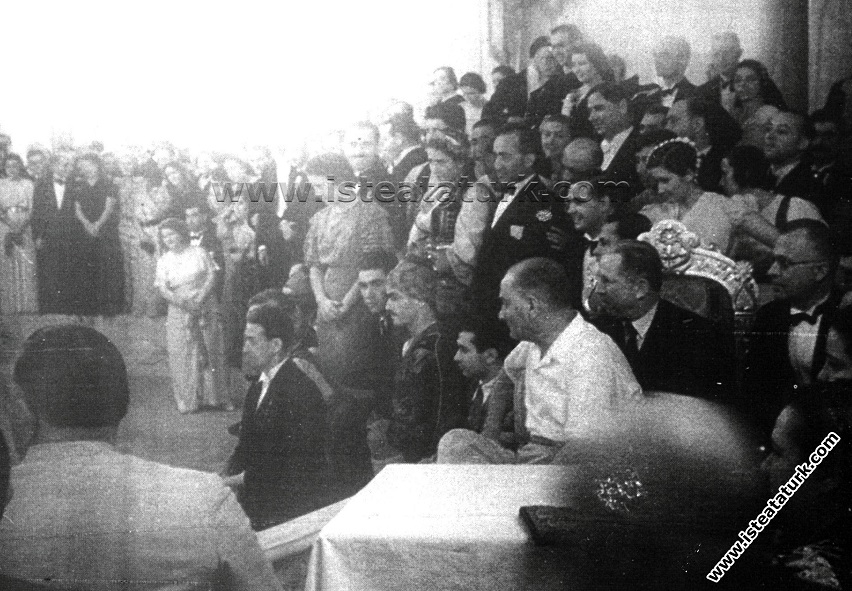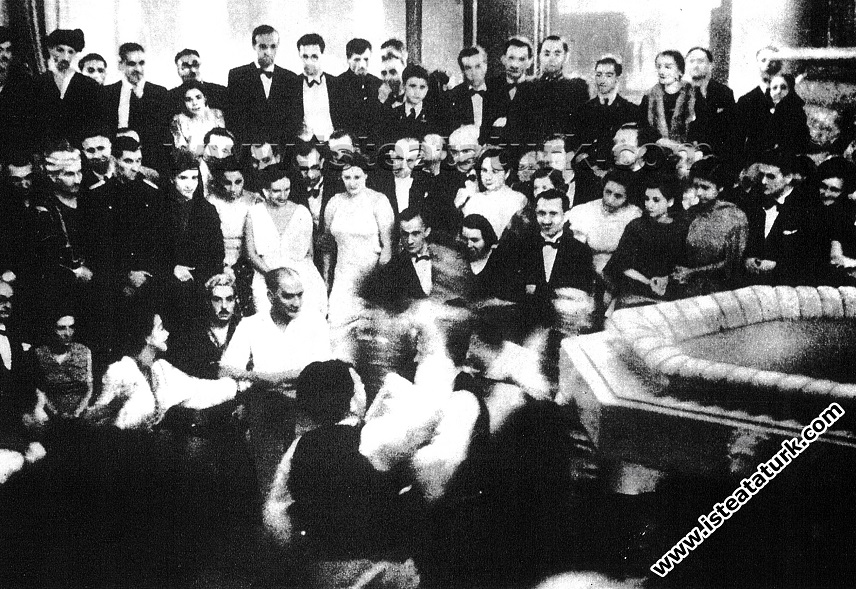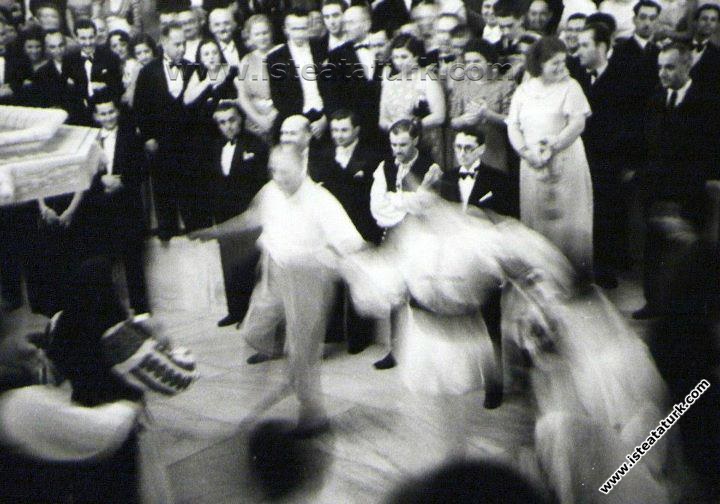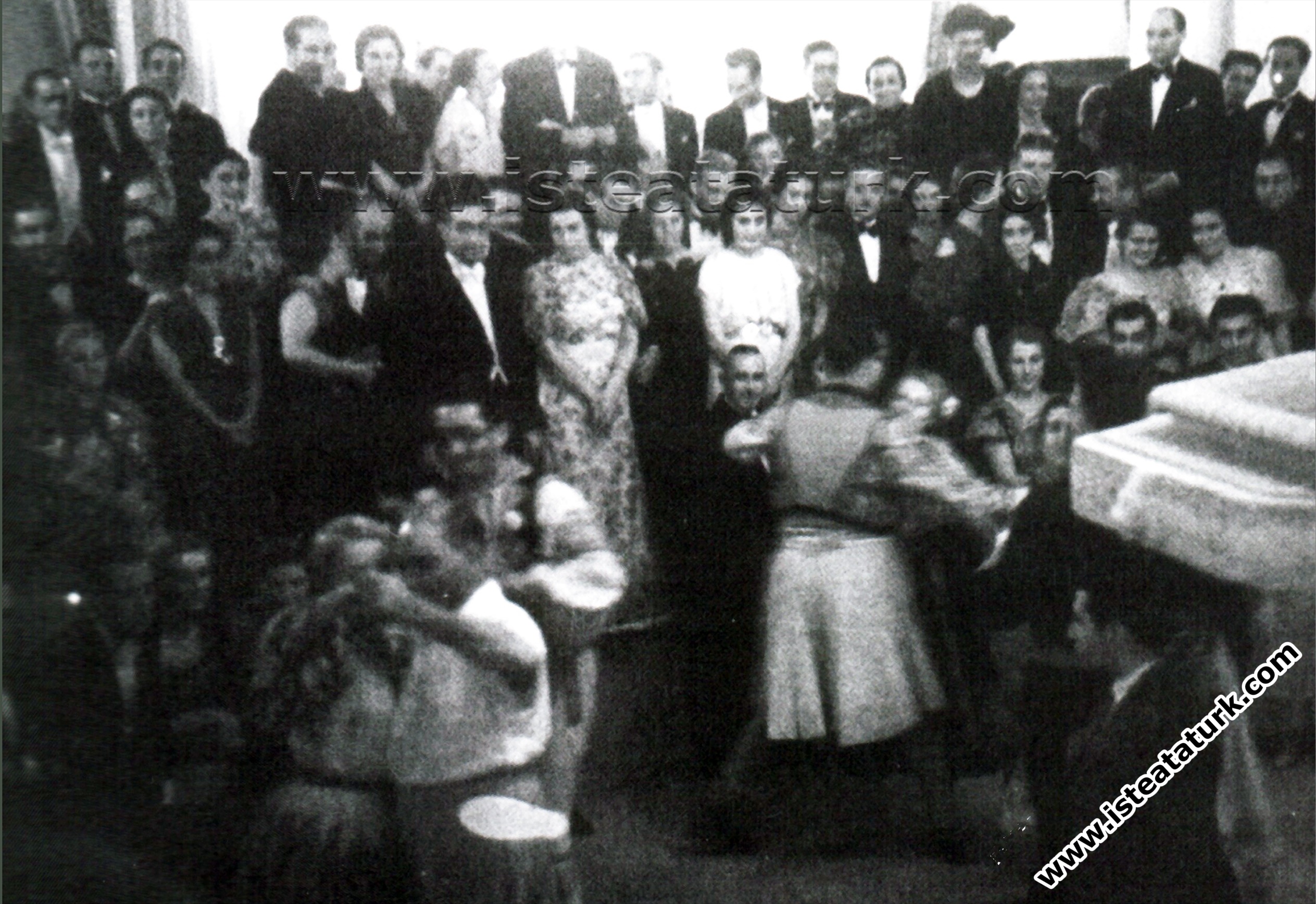
Atatürk's Favorite Folk Dance: Balıkesir Pamukçu Bengisi
Character Size
Atatürk's Favorite Folk Dance: Balıkesir Pamukçu Bengisi
Atatürk's Favorite Folk Dance: Balıkesir Pamukçu Bengisi
Atatürk went on a long country tour on the 15th of January 1933. The Republic was entering its tenth year. In the four corners of the country, there has been an incredible speed of development, shaking and resurrection. Not only the Turkish Nation, but the whole world knew and saw this. Atatürk first came to Eskişehir to see the works done once again, and from there he went to Bursa. Atatürk, who came to Gemlik from Bursa, set off for Bandırma on the evening of 20 January 1933 with the Gül Cemal Ferry. Balıkesir Governor İbrahim Ethem (Akıncı) and Mayor Naci (Kodanaz) welcomed Atatürk in Bandırma.
The next day, on January 21, 1933, Atatürk arrived in Balıkesir. The guests, who rested for a while in the Governor's Mansion, where Atatürk would stay, came to the Government, the Municipality, the Corps Headquarters, and the Republican People's Party. Everywhere they stopped, the people of Balıkesir showed enthusiasm. Atatürk, to the Mayor:
- I am very pleased with the sincere feelings that the people of Balıkesir show about me. “I would like you to express my special thanks,” he said.
The next day, January 22, 1933, was a cold winter day. He went straight to High School and Teacher's School. He attended classes. He talked to the teacher and students. He came to the Military Court and drank tea. The night was followed by the prepared representation. The zeybeks of Pamukçu village played the national games (bengi). Atatürk also participated in these games. He got on the train to go to Kütahya at midnight at 24.00.
Atatürk's last visit to Balıkesir was 24 June 1934. Atatürk made this trip together with Iranian Shah Reza Pahlavi. The guests, who got on the train from Izmir in a large delegation, arrived in Balikesir on June 24, 1934 at 17.00. They were greeted with great ceremony. Atatürk, who came to the Governor's Mansion with the Shah, watched the parade from the balcony. Then they toured Necati Bey Teacher's School. After spending the night in Balıkesir, they set sail for Çanakkale the next day.
Pamukçu Bengi Team was among those who welcomed Atatürk on June 24, 1934. Atatürk, who came to Balıkesir via İzmir with the Iranian Shah Rıza Pahlavi, is greeted at the train station by the Bengi team, which includes Tevfik Güngörmüş, Ahmet Atagün and Necip Şengül. Because he likes the team and the game so much, he plays it in his presence several times and expresses his appreciation. Unfortunately, the photograph taken by the team with Atatürk and Ali Hikmet Pasha has not survived; This photo was taken in front of the station. In this photograph, Atatürk put one hand on Ahmet Atagün's shoulder and the other on Tevfik Güngörmüş's shoulder.
Participating in the continuation of the tour by the order of Atatürk, the team went to Çanakkale with the vehicle allocated by Balıkesir Municipality and played Bengi several times. At the end of this trip, they are sent to Pamukçu after being given a gift of 300 liras.
In 1945, the Pamukçu Bengisi team went to Istanbul to perform at Küçük Çiftlik Park at the invitation of Ali Hikmet Pasha. Hearing that the Pamukçu team is in Istanbul, Atatürk invites all the players to Dolmabahçe Palace. In Dolmabahçe Palace, the wedding of the daughter of Izzettin Pasha, one of the army inspectors of that period, was held in Dolmabahçe. Atatürk was also present at the wedding.
In Talip Balcan's article in Balıkesirliler Magazine and Zekeriya Özdemir's book called Pamukçu, the memories of Tevfik Güngörmüş are described as follows:
“The wedding hall is quite crowded. Atatürk is calling us right away. He tours the palace. Then to us:
- Do you know dance? asked.
- No, Pasha, we said.
- Find out, he said.
We are silent. Ataturk continued;
"Look," he said. You have sisters and sisters in your hometown, right?
- Yes, Pasha.
- That's how you keep them.
Uncle Tevfik is expelled.
- Yes, Pasha, we Turks are all brothers.
Atatürk pats the satisfied Uncle Tevfik on the back and says: “Bravo Efe” and puts them all to dance with the girls there. Later,
- Come on, let's watch your play, he says.
The middle ground is empty, eyes are fixed on us. The dance floor looks like it's going to slide.
One of the Efes to Atatürk;
- Pasha says, this place is slipping. There is no carpet in this place?
Ataturk;
"Even though there are thirty porters, they can't bring the carpet here, wet the bottom of your shoes," he said.
We wet the bottom of our shoes. We started the game, it wasn't slipping. When we finished the play, the hall was moaning with applause.
In August 1935, “Beylerbeyi Palace Balkans Festival” was held in Istanbul in the presence of Atatürk. This festival is the first international folk dance festival held in Turkey. Folk dance teams from all over the country and teams from Balkan countries participated in the festival. In the festival, folk dance teams of four Balkan countries (Albania, Bulgaria, Romania, Greece) sang to the accompaniment of a common melody. On 31 August 1936, the Balkan Festival was held again. Apart from Yugoslavs, Romanians and Bulgarians, the festival was attended by Çoruh, Karadeniz, Balıkesir Pamukçu village and Istanbul Amateur Zeybek Team from Turkey. A ball was held in Beylerbeyi Palace on September 2, 1936 for the festival. At this ball, Atatürk insulted the players of the Balkan countries.
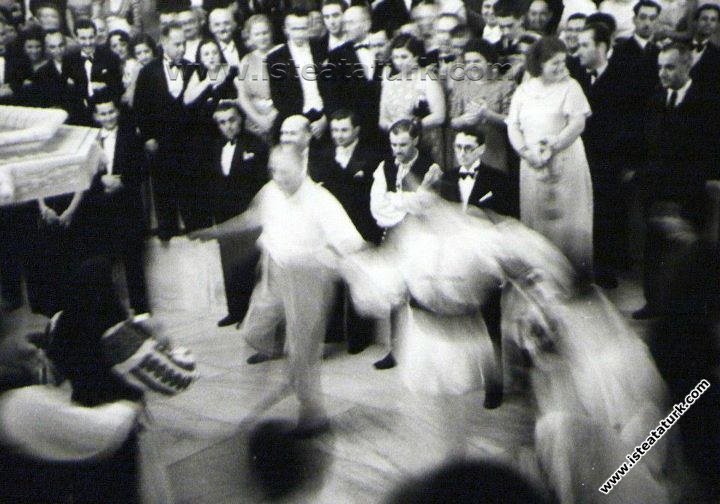
In the festival held in Beylerbeyi Palace, in which folk dance teams from Balkan Countries participated. (September 2-3, 1936)
Photos taken at the ball were published by Sabahattin Türkoğlu.
In the news published in Cumhuriyet Newspaper, dated September 4, 1936, after the ball; He writes, “Atatürk was very interested in the dances of Balıkesir zeybeks, especially in Erzurum weather, and they made them repeat them”.
Balıkesir Pamukçu Bengisi was played at the ball held in Beylerbeyi Palace due to the Balkan Festival. Balıkesir Bengi play participated in the Festival with Atatürk's special request.
Tevfik Güngörmüş recounted his memories of this festival and described the event that took place at the ball as follows:
“Atatürk loved the national games very much. Another encounter was that we were the first team to appear at the Balkan Festival. The game was over, we were resting on the side. Atatürk came to us.
- Do you have a country song to sing? Said.
Someone from Trabzon:
- Like this!
Trabzon started:
- ”Three chickpeas in Murtaza's vineyard,
"Mom, I'm dying, have me read Yasin".
Atatürk did not like it. sternly:
- Let it go, he said. We do not intend to die.
Then he turned to us:
- You, he said, do you know the song Zeynep?
- Yes.
We said it together. He was speaking with us.
Then with his participation:
- We sang the song “The ends of my handkerchief, I can't get out of the slopes”.
To Uncle Atatürk Tevfik:
"Get up, let's play Sarızeybek," he said.
We got to the game. To me:
"Careful, make no mistake," he said.
We played sarzeybek together.”
I am very pleased that this table of ours complements Mr. Nail tan's book titled “Atatürk and Turkish Folk Culture”.
The meaning of the word Bengi carries the meanings of "endless, eternal". We know that Göktürk works, which are Orhun inscriptions, are called "Bengü Taş".
There is also a different explanation for the word Bengi. According to this narrative; While the Turks migrated from Central Asia to Anatolia, they came to the war through various battles. During these battles, stand by the enemy they killed and shout "Bengi!" they would shout. While this situation continues as a tradition, it became the motif of the eternal game. Indeed, the game of bengi is a show of bravery.
The "Bengi" game, played with the names Benge, Benk, Menge, Mengi, Bengü, Mengü in various regions of Anatolia, is a type of zeybek.
Regarding Bengi games and their derivatives, in Mahmut Ragıp Gazimihal's Turkish Folk Dances Catalogue Volume 1, (Benge, Bengi, Bengi Altay, Bengi Game, Beng Game, Bengi Zeybeği Havasi, Benk, Balıkesir Games, Balıkesir Zeybeği), 2. It can be applied to the skin (Menge, Mengi, Pamukçu Bengisi, Pamukçu Zeybeği).
We can learn extensive information about Pamukçu Bengisi from a research by Murat Karabulut and from Zekeriya Özdemir's book.
I am quoting Pamukçu Bengi's play from Murat Karabulut's article by abbreviating it below:
“Pamukçu town is 10 km from Balıkesir. away. Its population is around 3,000. The livelihood of the people is based on agriculture and animal husbandry.
In this article, we will describe the folk dances, music and clothes played in Pamukçu.
The games described here are games played by men. In Pamukçu, men and women play separately. In the games played by men, a line must be followed. First in Double Safe, then Collective Safe, and finally Bengi.
Double Safe:
It is played by only two people. This is where its name comes from. Safe; Confidence means to be confident. The game is played very quickly. The rhythm is fast. It is one of the hardest games to play. Not everyone can play this game. Only two confident people can play this game.
Before starting the game, there is a short tour accompanied by music. In the region, this walk is called "Don't mind", and becoming a game starter is called "Playing". The game consists of collapse and rotation figures from start to finish. The game is continued with fast-paced serial movements.
Collectively Safe:
As it can be understood from the name of the game, it has taken this name because it is played by many people. The number of players must be even. (2-4-6 etc.) The tempo of the game is slower than double Safe. Those who play in Double Safe will have the opportunity to rest in this game. Because Bengi, which will be played from now on, is very fast and full of serial figures. Arm movements, kneeling and knocking on the ground are important figures in Collective Safe. When the figures are made collectively, they present a very beautiful image. Figures made in Double Safe are all made more heavily divisive.
Bengi
Bengi, which starts with a stroll accompanied by music before the game, is played with 8-10-12-15 people as well as with more people.
One of the main features of Zeybek dances is that the body is upright and the movements and gaze are rigid. There are various shouts in the game. Like Bengi... Equivalent... Genius... like. Bengi; It means endless, endless, we are forever strong. equivalent; It is a word of warning to be careful. Genius; These are the shouts that are thrown to excite the surroundings and the players. It is not easy to say and shout in this game, which is played at a very fast pace and requires dexterity.
These games are usually run by old men. These efeler were people who knew the game well and were disciplined. While they are playing, the others do not talk, they follow the ephesus with their eyes. When Efe yells like a genius... aha, everyone starts making a new figure. There is no surprise in the figure changes. Music reveals figure changes. Players know this. When appropriate, the effe shouts and all the players switch to a new figure. Players do not hold each other's hands. The games are played in a circle and from left to right.
Source people tell a story about these games. "After the spread of Islam among the Turks, in the wars between the enemy or rival tribes, they tried to explain the war between two enemy tribes by putting the strongest players into the game, with the game Binary Güvende, the general atmosphere of the war played after that and the general atmosphere of the last played. It has been explained that Bengi is the expression of the festivity organized around the captives of the winning side.”
Learning the games is very difficult. There is no specific form of teaching. However, it is known that until two or three years ago, zeybeks held chat meetings among themselves once a week during the winter months and learned the games at these meetings. The chat meeting takes place as follows. When a volunteer is heard in the village where the conversation will take place, all the village people meet in separate places on the same night according to their age groups. It happens that 7-8 or 10 home chats are organized. Before the chat starts, a "Dayıbaşı" who manages the meeting is selected for each chat. Dayıbaşı is responsible for everything in the conversation. No one can object to him, and everyone must obey him. For this reason, Dayıbaşı is chosen from the people who are mentioned and loved. It is eaten, drunk, anecdotes and stories are told through conversation. Women do not participate in this conversation, but they watch the conversation. The advantage of this watching job is that the conversation is more enjoyable if the loved ones of the single men participating in the conversation are also present as the audience at that moment. Because the people of yavuklu reveal all their ingenuity to make themselves liked. While the conversation is going on, if anyone wants to get permission from the Dayıbaşı, they can go to other chat meetings as a guest and join the fun there. Thus, all the chat houses in the village are visited in groups. The village is full of people. Thus, all the chat houses in the village are visited in groups. The village is full of people. Thus, all the chat houses in the village are visited in groups. The village is full of people.
The instruments that participate in the games are the cinernet and the drum. When they play among themselves, darbuka, def, zilli tongs are used. It was determined that drums and zurna were used in plays 50-60 years ago.
Famous players who played Pamukçu games best: Kazım Kabakcı Efe (nicknamed Civelek) in Double Safe. Halil İbrahim Dal (His nickname is Süvari). It is said that when these two Efes play, they pass out and they play very well. Other than these efes, Hacı Necip Şengül (Çakıroğlu) and İsmail Efe (Helvacı). Mehmet Ali Erik (Barut) is one of the players who play İkili Güvende well together.
Clothes:
At the beginning, there is a feltkulah made of sheep's wool. A colored pouch is wrapped around it. He has a writing on his neck. The edges of the writing are serrated and embroidered. It becomes a piercing vest inside, it is worn inside. Piercing is sleeveless vest. It is made from chufa (broadcloth). It is open in front. It can also be buttoned. The zipper is the same as today's cloak and should be sleeved and buttoned in the front. It just doesn't have a collar. The sleeves of the jacket worn on the top are torn from the armpit to the wrist. In other words, it is a separate piece that swings down from the front. It swings left and right while playing.
The top of the pocket is embroidered. Its fabric is made of the same burlap fabric. The interior is white or red lined. The top of the cepken is embroidered by hand with black colored glitter or similar threads called kaytan or tergil.
First, a white cloth of local weaving, called a girdle, is wrapped around the waist. It won't be too long. The front part of the belt is twisted and wrapped. A colored belt called trabulus or shawl is wrapped on top of it. An oiler is also attached to the waist. The oily handkerchief is the handkerchief made by the engaged girls to their fiancees. Men also wear the current silk handkerchief.
There is a shalwar (potur) at the bottom. The shalwar is up to the knee. The tip is white in color. Its network is abundant. It narrows towards the knee. This one is also made of chufa fabric and is embroidered like a cepken.
There are socks on the feet, but the socks are not visible. Because there is leggings between the knee and ankle. It is also made of burlap fabric. It is blue in color. It should be embroidered with tape. The leggings are tied above the knee with red tassel laces. The tassels come to the outer part of the leg. He has a standing black Yemeni.
In the past, a leather weapon was attached to the waist, and a wedge, money bag and a tobacco layer were placed between the 3-4-layered u-arms.
While the Bengi game is being played, there is a short interruption in the game. During this interruption, zeybeks have the opportunity to check and fix their leggings, fez, posh and girdle. During this short interruption, a poem is recited, which is a testament to how much the play identifies with Atatürk. Here is the entire poem:
Shanli EFEM
O my heart's kaaba, lovely Anatolia
In every smoking stove full of glory
The Aegean of the country is the bed of lions
Gives food to the souls, purple capped ephesus
Hey Marmara, Aegean, Anatolia
Wave after wave, Gulf of Edremit
I don't know if there is a magic in your soil
At the beginning of the border of tens of thousands of ephemes
We saw their efe in the War of Independence
The victories I have won do not fit into history
Hearts attached to you with an unshakable faith
Efem, whose eypala shines brightly
O efem, whose eyes are full of light and lightning flashes
It's worthy of the Manisa Mountains, hey
Blue eyes mingle with the sky
The mare's back is ours
Aydin's peak efe quarry hey
The wind blows to the village of effemin
Let him play and see at the wedding venue
As you press, the ground rots and shakes like a wreck
Glory upon glory, my lord
These folks expect it
Balıkesir Plain has a vineyard and a garden
Pamukçu Ephesus has a reputation and an epic
My Arslan Efe has an edict from Ata who became a gang
Let the drum beat, let the clarinet play
double boiler boil
Let your efes play while purple velvet silk pocket
Hayrettin IVGIN
Proceedings of the 1st International Atatürk and Turkish Folk Culture Symposium
Source: http://ekitap.kulturturizm.gov.tr
